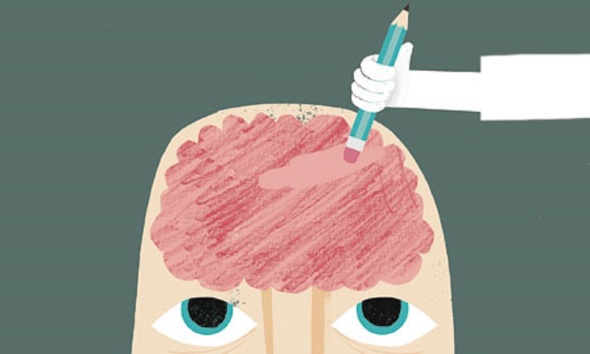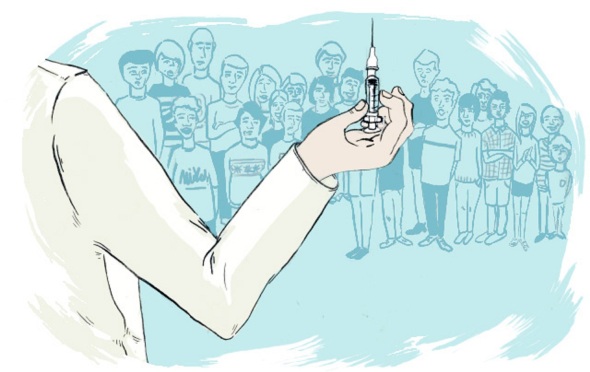New theory tries to define where black holes don’t exist
The quintessential feature of a black hole is its “point of no return,” or what is more technically called its event horizon, yes just like the movie. When anything—a star, a particle, or wayward human—crosses this horizon, the black hole’s massive gravity pulls it in with such force that it is impossible to escape. At least, this is what happens in traditional black hole models based on general relativity. In general, the existence of this event horizon is responsible for most of the strange phenomena associated with black holes.
Same sex relationships and stress: A new perspective
Studies of stress and its effects on health have typically focused on the worries of an individual: money, love, health, work. When we turn our attention on relationship stress, the focus is generally on your typical couple. However, new research studies how minority stress — which results from being stigmatized and disadvantaged in society — affects same-sex couples’ stress levels and overall health.
Mental illness treatment, there’s NOT an app for that
It’s more socially acceptable to talk about mental illness, which is important since the number of people who have it — or should we say, are getting treatment for mental illness — has steadily increased over the years. While it still may be taboo to talk about, mental illness is a very real thing needing very real treatment, however new research now shows that texting may be a more suitable treatment aid for those with mental illness than mobile applications.
Political gridlock: Blame the men
It feels like the government moves at a snails pace sometimes, it takes forever for any change to come about and even then it is typically not even “change.” This couldn’t be more evident than during the political gridlock that led to the 2013 US federal government shutdown, the leading voices for compromise were the handful of female U.S. senators — only 20 percent of the overall legislative body.
Everyday chemical exposure leads to early menopause
Seems like everything is killing us these days. Well ladies, you have one more thing that is causing you problems. New research has shown that women whose bodies have high levels of chemicals found in plastics, personal-care products, common household items and the environment experience menopause two to four years earlier than women with lower levels of these chemicals.
Your brain is hardening your arteries, but not on purpose!
Your brain might just be killing you slowly. Atherosclerosis — or hardening and narrowing of the arteries — can be caused by fat buildup that causes plaque deposits, and is one of the main causes of cardiovascular disease. What does that have to do with the brain? Well new research has shown a link between how the brain regulates fat metabolism, which has the potential of stopping the development of this disease risk factor in obesity and diabetes.
You can’t unboil an egg? Well… now you can.
There is a saying, “you can’t unboil an egg.” Usually this is just illustrating cause and effect; you can’t turn back time, or what’s done is done. Well now scientists have successfully unboiled an egg, so suck it thermodynamics. An international team of chemists have accomplished this feat – an innovation that could dramatically reduce costs for cancer treatments, food production and other segments of the $160 billion global biotechnology industry, according to the findings.
Hyper sleep- A “down to earth” space story
It was every kids’ dream to go into space, not understanding the perils or the boredom that comes with it. The idea of floating weightless and “boldly going where no man has gone before” permeated the imagination as nothing had ever done before. Space, why did there have to be so much of it?
Lucid dreaming: The similarities between dreaming and wakefulness
To control one’s dreams and to live out there what is impossible in real life — a truly tempting idea. Some people — so-called lucid dreamers — can do this. Researchers have discovered that the brain area which enables self-reflection is larger in lucid dreamers. Thus, lucid dreamers are possibly also more self-reflecting when they are awake.
Mothers don’t speak clearly to their babies
People have a distinctive way of talking to babies and small children: We speak more slowly, using a sing-song voice, and tend to use cutesy words like “tummy”. While we might be inclined to think that we talk this way because it is easier for children to understand, new research suggests that, surprisingly, mothers may actually speak less clearly to their infants than they do to adults.
Belief’s effect on biochemistry in cases of addiction
Ever wonder what makes people susceptible to addiction? Think about it, some people can stop addictive painkillers without a problem and others, well others are not so lucky. So the big question is are there more than biophysical factors at play in addiction? A new study shows that cognitive beliefs play a significant role in a person’s neurological response to an addictive substance and that belief can diminish the neurological effects of an addictive drug.
Fish, mercury, and pregnancy: Good news for seafood lovers
People freak out when they hear mercury is in something and sometimes for good reasons. In vaccinations for example a very small amount of ethyl-mercury WAS used as a preservative in vaccines, people got scared so now it is not used in most vaccines. Methylmercury* however is found in seafood and larger fish in particular (in much, much higher concentrations than in vaccines mind you). They may sound the same, but the methylmercury in fish is far more toxic. That said, it turns out that fish isn’t as toxic as we thought, so all you pregnant women who love fish will be happy to hear this.
You can live longer, but not healthier
We all want to live longer and thanks to medical technologies our life expectancies have dramatically increased. Which would be handy if we could actually enjoy the extra years. Unfortunately a study of long-lived mutant C. elegans by scientists shows that the genetically altered worms spend a greater portion of their life in a frail state and exhibit less activity as they age than typical nematodes. These findings suggest that genes that increase longevity may not significantly increase healthy lifespan and point to the need to measure health as part of aging studies going forward.
Fear, PTSD, and newly found neural circuits in the brain
People with anxiety disorders, such as post traumatic stress disorder (PTSD), often experience prolonged and exaggerated fearfulness. Now, an animal study suggests that this might involve disruption of a gradual shifting of brain circuitry for retrieving fear memories. Researchers have discovered in rats that an old fear memory is recalled by a separate brain pathway from the one originally used to recall it when it was fresh.
Stem cells derived from amniotic tissues have immunosuppressive properties
Stem cells derived from human amnion have for some time been considered promising for cell therapies because of their ease of access, ability to differentiate, and absence of ethical issues. Now, a research team has found that stem cells derived from human female amnion also have immunosuppressive activity and that the addition of antibodies to specific factors can enhance their immunosuppressive potential.
Pythagoras theorem could improve patient care
Triangles, few of us have ever thought of a relationship between healthcare and triangles. Most of us will remember Pythagoras theorem from our school days, but rarely have a reason to use it in day-to-day life. Well for Doctors that might change, a team of medical researchers has found the 2,500-year-old Pythagoras theorem could be the most effective way to identify the point at which a patient’s health begins to improve.
New genetic clues in fragile x syndrome
Scientists have gained new insight into fragile X syndrome — the most common cause of inherited intellectual disability — by studying the case of a person without the disorder, but with two of its classic symptoms.
Scientists use the brain to direct fat burning
Does it seem like no matter what you do, you still can’t shed the pounds? You know what to eat, how to eat and workout regularly, but the weight just won’t go away, well you may not be alone. There are many different medical conditions that limit your ability to lose weight, but thankfully science has now found how to use your brain to shed the weight.
The hidden neurological impact of explosions on military members
More bad news for war Veterans, the brains of some Iraq and Afghanistan combat veterans who survived blasts from improvised explosive devices (IEDs) and died later of other causes show a distinctive honeycomb pattern of broken and swollen nerve fibers throughout critical brain regions, including those that control executive function. The pattern is different from brain damage caused by car crashes, drug overdoses or collision sports, and may be the never-before-reported signature of blast injuries suffered by soldiers as far back as World War I.
Genetic brain disorders start at the synapse
As we’ve seen from research featured here at the lab, there are many genetic disorders that cause intellectual disability and autism. Historically, these were viewed as untreatable. However, in recent years we have shown via animal models that it is possible to reverse the effects of these gene mutations. But the question remained whether different gene mutations disrupt common physiological processes. If this were the case, a treatment developed for one genetic cause of autism and intellectual disability might be useful for many others.
Study shows rise in mass die-offs
You really don’t hear much about mass die-offs from mainstream news outlets; this might make you think they don’t happen that often. However, an analysis of 727 mass die-offs of nearly 2,500 animal species from the past 70 years has found that such events are increasing among birds, fish, and marine invertebrates. At the same time, the number of individuals killed appears to be decreasing for reptiles and amphibians, and is unchanged for mammals.
Being angry might be good for your health
In the US and many Western countries, people are urged to manage feelings of anger or suffer its ill effects. We are raised to, for a large part, stifle our emotions and to “not be so angry.” However, new research with participants from the US and Japan suggests that anger may actually be linked with better, not worse, health at least in certain cultures.
Experiment showcasing humanity’s ‘dark side’ may offer a way to control it
It was an infamous experiment, one on obedience and reprehensible behavior done in 1961. With memories of Holocaust atrocities and the prosecution of Nazi officials at Nuremberg still fresh, psychologist Stanley Milgram made history. You may not remember the name per say, but chances are you know his work.
Humans keep the memories accurate by forgetting
Your brain is a memory powerhouse, constantly recording experiences in long-term memory. Those memories help you find your way through the world: Who works the counter each morning at your favorite coffee shop? How do you turn on the headlights of your car? What color is your best friend’s house? But then your barista leaves for law school, you finally buy a new car and your buddy spends the summer with a paint brush in hand. Suddenly, your memories are out of date. So what do you do, forget about it.
Music takes the pain away post surgery
In today’s society, when it is so easy to over medicate children and adults alike it is nice to finally read something that looks for an alternative option. This particular case deals with pain management in children post surgery and the study shows that pediatric patients who listened to 30 minutes of songs by Rihanna, Taylor Swift and other singers of their choosing — or audio books — had a significant reduction in pain after major surgery.
New antibiotic may help slow drug resistance
Antibiotic resistance, a hot topic lately here at the labs, as evidence by this recent post. So it is fortuitous that I stumbled upon this little bit of research that suggests scientists (using a “revolutionary” approach) have devised an antibiotic that may offset the mounting problem of drug resistance for decades… hopefully.
Creating a better diet pill: The new drug that is making big promises
Losing the weight, some of us never seem to be able to do it. Whether it is poor choice in diet, a medical condition, or just a sedentary lifestyle, people everywhere are finding they can’t shed the pounds. Now there is a new drug that promises help in the weight loss department and works like nothing we’ve seen used for weight loss yet. The compound effectively stopped weight gain, lowered cholesterol, controlled blood sugar and minimized inflammation in mice, making it an excellent candidate for a rapid transition into human clinical trials.
Outsmarting superbugs’ countermoves to antibiotics
With drug-resistant bacteria on the rise, even common infections that were easily controlled for decades — such as pneumonia or urinary tract infections — are proving trickier to treat with standard antibiotics. New drugs are desperately needed, but so are ways to maximize the effective lifespan of these drugs.
Not everyone sees health decline from obesity, but why is that?
The news isn’t shy in reporting the effects of being obese, high blood pressure, and diabetes (just to name a few). However, new research demonstrates that obesity does not always go hand in hand with metabolic changes in the body that can lead to diabetes, heart disease and stroke. Determining how and why may help reduce or eliminate the health risks in other people dealing with obesity.
HIV vaccines may make things worse
Despite what conspiracy theorists say, there is no cure for HIV. Not that people aren’t feverously working hard to find one, it is just really hard to do. To illustrate that point researchers have found that vaccines designed to protect against HIV can backfire and lead to increased rates of infection. This unfortunate effect has been seen in more than one vaccine clinical trial.
New cancer treatment targets telomeres
Cancer, right now we don’t have much to fight it besides the standard surgery or chemo, neither of which is a great option. Well now scientists have targeted telomeres with a small molecule called 6-thiodG that takes advantage of the cell’s ‘biological clock’ to kill cancer cells and shrink tumor growth. Ideally this new technique will help eliminate the need for nasty drugs like those used in chemotherapy.


































